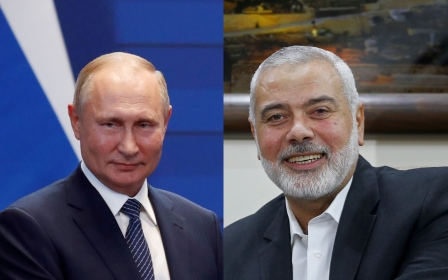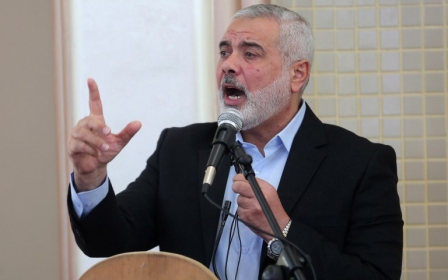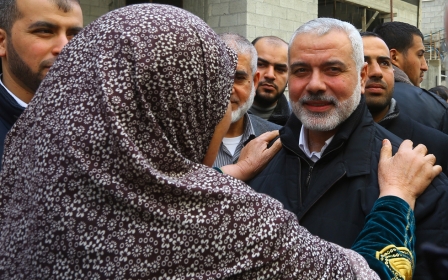'Teach him a lesson': Egypt's fury over Hamas leader's trip to Tehran

Since last month's visit by Ismail Haniyeh, the head of the political bureau of Hamas, to Tehran to participate in Qassem Soleimani's funeral, there has been much talk of the deteriorating relationship of Hamas with Egypt.
Leaks from several sources indicate that Hamas had promised Egypt's intelligence service that Haniyeh’s ongoing tour of foreign countries - facilitated by Cairo - would not include a visit to Iran.
However, the assassination of Soleimani in a US air strike on Baghdad in January was framed by Hamas as an "emergency event" that gave Haniyeh no option but to travel to Iran.
Haniyeh headed a senior Hamas delegation at the funeral, which was seen as an opportunity for the organisation to restore a relationship with Tehran that has been damaged by the two parties' differing stances on the Syrian civil war.
However, according to observers and analysts, the Egyptian government and some Palestinian factions believe Haniyeh overstepped his participation in the funeral, by describing Soleimani in florid terms as "the martyr of Jerusalem" and praising him for Iran's policy towards the Palestinian issue.
New MEE newsletter: Jerusalem Dispatch
Sign up to get the latest insights and analysis on Israel-Palestine, alongside Turkey Unpacked and other MEE newsletters
Since Haniyeh’s visit to Tehran, several developments have taken place that observers believe indicate Egyptian anger towards Hamas and deteriorating relations.
Last month, Hamas, which governs the besieged Gaza Strip, allowed incendiary balloons to be floated into Israel from the coastal enclave for the first time in months - prompting heavy Israeli bombardment.
Yet Egypt, which plays a key role in monitoring the implementation of a ceasefire in Gaza, stayed noticeably clear from any role in de-escalating events. Meanwhile, Cairo also withheld supplies of household gas to the Strip.
'We disagree and agree with Egypt'
Hamas, for its part, does not deny that the visit to Tehran was met with “Egyptian uneasiness”, but at the same time it has been keen to confirm the "strength" of its relationship with Cairo, and that it does not accept "an alternative to Egypt to manage Palestinian national issues", according to a statement by Khalil al-Hayya, deputy head of Hamas in Gaza.
Hayya acknowledged that "Egypt has taken a stance on our visit to Iran", adding that "the Egyptians are rational and we have discussed the matter with them... we disagree and agree with Egypt, and the policy requires that, and we are working to restore relations with all countries and entities".
However, an informed source revealed to Middle East Eye that Palestinian factions in Gaza had tried to reach out to Cairo and "restore" relations following Haniyeh's Tehran visit, but had not received a response.
The source, preferring to stay anonymous, stressed that Egypt was not seeking a complete break with Hamas.
They said Cairo was aware of the importance of Hamas in the Palestinian scene, especially in Gaza, and was pleased with the cooperation witnessed recently between the two sides on several issues, the most important being security and the securing of the borders with Gaza.
However, at the same time, the source said Egypt was upset with Haniyeh's visit and the prospect of Tehran playing a bigger and more influential role in the Palestinian issue, thus affecting Egypt's role and impeding Cairo's quest for a protracted truce with Israel in Gaza.
As a result, Cairo would not ignore Haniyeh's visit to Tehran without "teaching him a lesson", the source said.
The source emphasised that Cairo's actions against Hamas would continue to be calculated, as it prefers Haniyeh to remain at the top of Hamas in upcoming internal elections slated to be held at the end of 2020, and keep him "under control" in Gaza.
The alternative - the return of former political bureau chief Khaled Mashaal, who is supported by Qatar and Turkey - is a far worse prospect for Egypt.
'His presence abroad... is a strength'
Raafat Morra, the head of the media department of Hamas abroad, preferred not to delve into the strained relationship with Egypt, but said without explicitly referring to Egypt: "Some countries are disturbed by the visits of Haniyeh, including the visit to Iran, but this has no justification, because the stance of Hamas is known and clear, and it has made several visits to Iran before."
"Our visits to any country are not directed against any other nation because our policy is to communicate with all forces for the benefit of our people and our cause," he added.
Regarding Haniyeh's foreign tour, Morra said the Hamas leader was travelling for the first time since his election as head of the political bureau in 2017 and that the tour has several goals, including meeting all of the leadership and executive frameworks of the movement that operate outside Palestine.
Morra said that during Haniyeh's visit to six countries so far he had also held meetings with presidents and leaders in which they discussed the latest developments in the Palestinian issue, and there is an intention to visit other countries.
The spokesman did not specify a date for Haniyeh's return to Gaza, but said: "Today, his presence abroad after the announcement of the so-called 'deal of the century' is a strength for following up on his political efforts in communicating with a number of officials, explaining the danger of this deal regarding the Palestinian issue and clarifying the position of Hamas.”
However, the same anonymous source who spoke to MEE about Cairo's reaction said that the Hamas leader's presence abroad during this period was not related to a "predetermined" schedule of visits, and that his return to Gaza was linked to Egypt's consent and the end of its anger over his visit.
Pressure on Egypt
Observers believe that the decision by Hamas to allow the resumption of incendiary balloons was meant as a message to Egypt, in order to achieve two goals.
Firstly, to put pressure on Israel to implement previous undertakings and ease the siege. But secondly, for Cairo to address the tensions over Haniyeh's visit to Tehran.
What was remarkable, however, was the absence of any Egyptian mediation despite the Israeli air strikes.
Israeli affairs columnist Mustafa Ibrahim supports the belief that the incendiary balloons and rockets directed at Israel were a message to Egypt, and come in the context of pressuring it to send its security delegation to Gaza to overcome the tensions with Hamas.
Ibrahim does not rule out that the length of Egypt's neglect of Hamas will lead to a deterioration in the security situation in Gaza - especially with Israel's failure to adhere to the measures agreed to ease the blockade - which could lead to a military escalation or the resumption of the weekly protests, but not necessarily open war.
In spite of the latest developments, Hamza Abu Shanab, a political analyst affiliated to Hamas, does not believe that Hamas’ relationship with Egypt has witnessed any "setback", despite his admission that Egypt "blames" Haniyeh for his visit to Tehran.
Abu Shanab told MEE that the contacts are continuous, and have not been interrupted, and there are common interests and no one is indispensable for the other.
According to Abu Shanab, Cairo gave no stipulation that Haniyeh could not visit Tehran, but at the same time it was not keen on it, as Iran and Egypt belong to two competing regional axes.
Saudi pressure?
Thabet al-Amor, a researcher in the affairs of Islamic movements, agrees with Abu Shanab that Hamas’ relationship with Egypt is based on mutual interest and that Haniyeh’s visit to Tehran will not lead to the collapse of the relationship.
Amor told MEE that Hamas realises it could not continue to govern Gaza without Egyptian backing, and therefore used "political realism" in its dealing with the Egyptian government, separate from its relationship with the Muslim Brotherhood.
In return, said Amor, Egypt has an interest in continuing contacts with Hamas, especially with regard to the security of its Sinai-Gaza border.
Amor believes that Haniyeh, in his visit to Tehran, may have made a political misstep but that it had been good in terms of a "relocation" of the movement.
Hamas can no longer establish all these "contradictory relations" in light of the regional alliances in the region, said Amor.
Egypt supports Saudi Arabia against Iran and Cairo's anger may be due to an angry message from Riyadh that "Haniyeh's tour has passed the kingdom's limits", he added.
Middle East Eye delivers independent and unrivalled coverage and analysis of the Middle East, North Africa and beyond. To learn more about republishing this content and the associated fees, please fill out this form. More about MEE can be found here.




